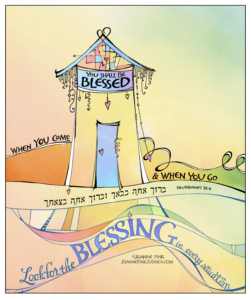This week’s Torah portion, Chayei Sarah, has always held special meaning for me — both because it was my Bat Mitzvah parasha and because kindness is one of my core values. In this portion, Rebecca’s generous act of drawing water not only for Abraham’s servant but also for his ten camels becomes a turning point in the unfolding story. Her kindness is wholehearted, intuitive, and transformative — a reminder that small, genuine acts can change the world.
As I accompany my daughter through her recent diagnosis of stage four, triple-negative breast cancer, I’ve been deeply touched by the kindness of our community. Your messages, prayers, and gestures of support have strengthened and comforted us during this difficult time. I would be grateful if you would keep Sam — Shira Natanya bat Yocheved — in your Mi Shebeirach prayers.
This week’s illustrated prayer, The Light of Kindness, invites us to let our souls shine through compassion and connection. I hope it brings comfort, inspiration, and a sense of blessing to your week.
Prayer
Lech Lecha — Trusting the Journey
“Lech Lecha — Go forth to the land that I will show you.”
This week’s Torah portion invites us to trust the journey, even when the destination is unknown. In this week’s reflection, I share my illustration of Genesis 12:1, the prayer Not Knowing from my soon-to-be-released book Illuminated Journey, and a new illustrated prayer, Journey.
I also share information and resources about BRCA awareness in the Jewish community — and ask for prayers for my daughter, Samantha Trattner (Shira Natanya bat Yocheved), who is courageously navigating her own unexpected journey.
In the Liminal Space Between Endings and Beginnings
Each year on Simchat Torah, we complete the reading of Deuteronomy and immediately begin Genesis, stepping into the liminal space between endings and beginnings. This sacred turning invites us to hold joy and sorrow, grief and hope, as we remember, reflect, and renew our connection to the Divine and to one another.
Standing Together in the Days of Awe
This week, as we read Parashat Vayelech and observe Shabbat Shuva—the Shabbat of Return—we are reminded of God’s abiding presence during the Ten Days of Awe. I’m sharing a new prayer, You Are Not Alone, along with a responsive reading, May I Find Forgiveness. May these words bring comfort, hope, and inspiration as we prepare for Yom Kippur.
Looking for Blessings
Parashat Ki Tavo teaches that every threshold holds spiritual possibility. Explore blessings in your own comings and goings with a prayer, journaling prompts, and creative resources.
Opening the Gates
This week’s Torah portion, Re’eh, reminds us that life is filled with choices—both large and small—and that our decisions ripple outward to shape the world around us. As we welcome the month of Elul, a season of cheshbon hanefesh (soul-accounting), may we choose wisely, bless abundantly, and prepare our hearts for the journey of t’shuvah.






